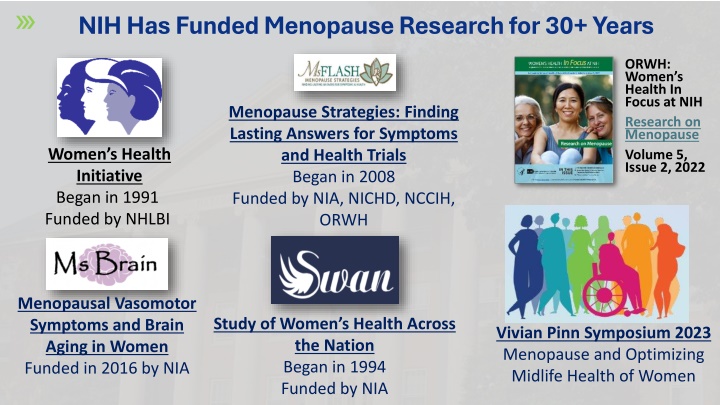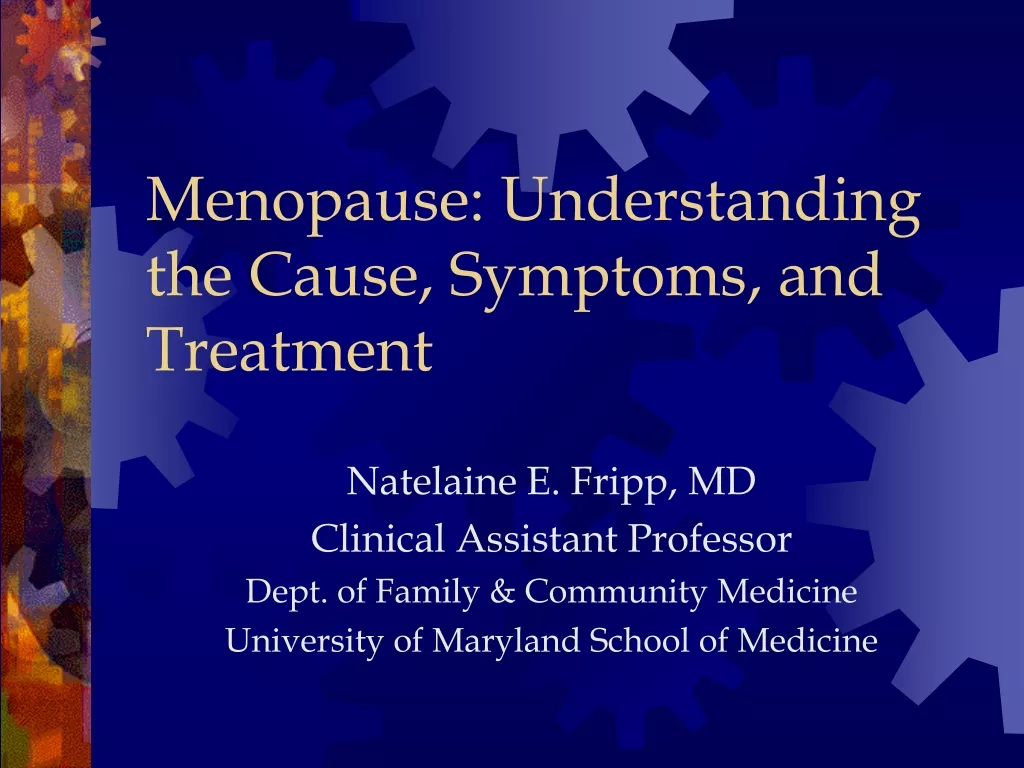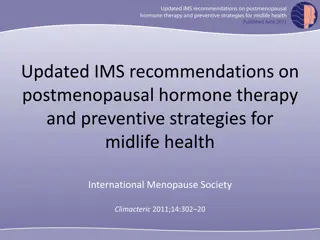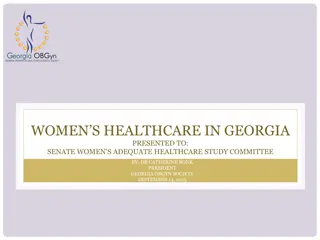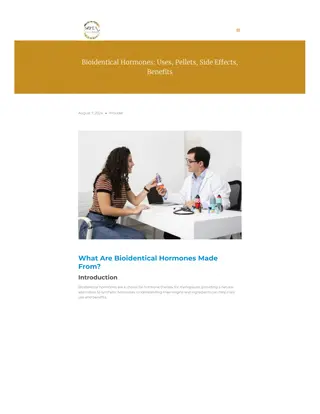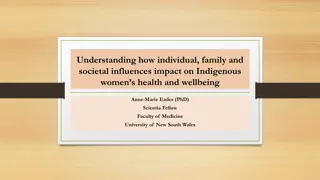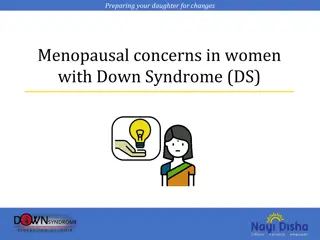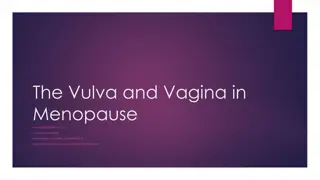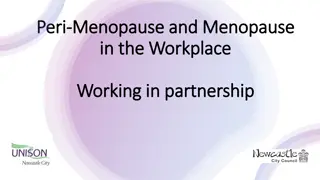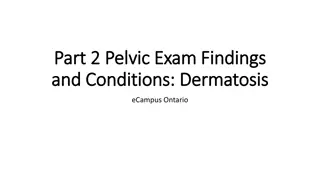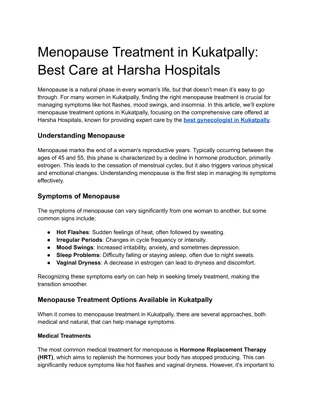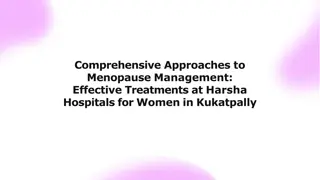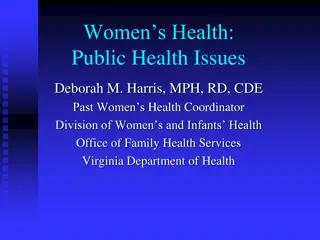Women's Health Research on Menopause
NIH has funded menopause research for over 30 years, focusing on finding lasting answers for symptoms and health issues. Research studies include topics such as brain aging in women, vasomotor symptoms, and the impact of estrogen decline. Current studies for FY23 delve into areas like cognition decline, immune activation, bone health, and emotional memory in aging females. Gaps in menopause knowledge include improved diagnostics, biomarker identification, and understanding the link between symptoms severity and future disease risk.
Download Presentation

Please find below an Image/Link to download the presentation.
The content on the website is provided AS IS for your information and personal use only. It may not be sold, licensed, or shared on other websites without obtaining consent from the author.If you encounter any issues during the download, it is possible that the publisher has removed the file from their server.
You are allowed to download the files provided on this website for personal or commercial use, subject to the condition that they are used lawfully. All files are the property of their respective owners.
The content on the website is provided AS IS for your information and personal use only. It may not be sold, licensed, or shared on other websites without obtaining consent from the author.
E N D
Presentation Transcript
NIH Has Funded Menopause Research for 30+ Years ORWH: Women s Health In Research on Menopause Focus at NIH Research on Menopause Volume 5, Issue 2, 2022 Menopause Strategies: Finding Lasting Answers for Symptoms and Health Trials Began in 2008 Funded by NIA, NICHD, NCCIH, ORWH Research on Menopause Women s Health Initiative Began in 1991 Funded by NHLBI Menopausal Vasomotor Symptoms and Brain Aging in Women Funded in 2016 by NIA Study of Women s Health Across the Nation Began in 1994 Funded by NIA Vivian Pinn Symposium 2023 Menopause and Optimizing Midlife Health of Women 1
Womens Health Research on Menopause is Supported across NIH Institutes and Centers RCDC Menopause Funding by IC FY23 Total $56 Million Across 127 Total Projects
Sample of Current Research Studies FY23 PhytoSERM Efficacy to Prevent Menopause Associated Decline in Brain Metabolism and Cognition: A Double-Blind, Randomized, Placebo-Controlled Phase 2 Clinical Trial Menopause-related increase in gut leak and its relation to immune activation, bone density decline and fractures Evaluating the natural evolution of myocardial stiffness in aging, sex differences, and through menopause transition in women, using a free-breathing magnetic resonance elastography approach Estrogen Declines with Menopause: Impacts on the Medial Temporal Lobe Network and Emotional Memory in Aging Females at Genetic Risk for Alzheimer s Disease Estrogen receptor reprogramming ligands for the prevention of protracted menopausal symptoms and chronic diseases Hot Flashes and Neurovascular Function in Women 1 2 3 4 5 6 3
Using Systems Biology to Understand Midlife Health of Women Anxiety, Depression, Substance Use Exercise Quality of Life Sleep Microbiome Nutrition POSTMENOPAUSE PERIMENOPAUSE MENOPAUSE TRANSITION 4
Gaps in Menopause Knowledge (1) Diagnosis: o Are there improved diagnostics by which to assign symptoms (e.g., hot flashes, insomnia) to menopause rather than other conditions (e.g., hypothyroidism mental health disorders)? o Which biomarkers best predict the timing or duration of menopause and/ or menopausal symptoms? o Does the severity of symptoms identify women who may be at risk of disease later in life? Disease Prevention: o What specific interventions (e.g., medication, nutrition, exercise, mental health) that improve the menopausal transition symptoms and better outcomes after menopause? 5
Gaps in Menopause Knowledge (2) Therapy: o Are there improved treatments (hormonal and non hormonal) that can improve quality of life for women during the menopause transition? o Are new hormone formulations and delivery options beneficial? Timing: o When are interventions of most benefit to women? For early or iatrogenic menopause? Implementation: o Can we equitably improve education and access to care for all women with symptoms of menopause desiring intervention? 6
NIH Efforts Support Menopause Research and Women NIH Efforts Support Menopause Research and Women https://orwh.od.nih.gov/womens-health-equity-inclusion/research-on-menopause-midlife- health Read about My Menoplan: Evidence-Based Menopause Tool to Support Women Pathways to Prevention https://prevention.nih.gov/research-priorities/research-needs-and- gaps/pathways-prevention https://mymenoplan.org/
